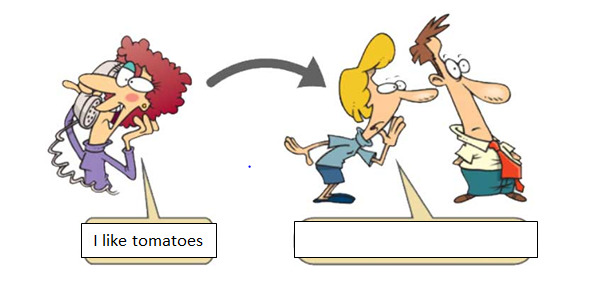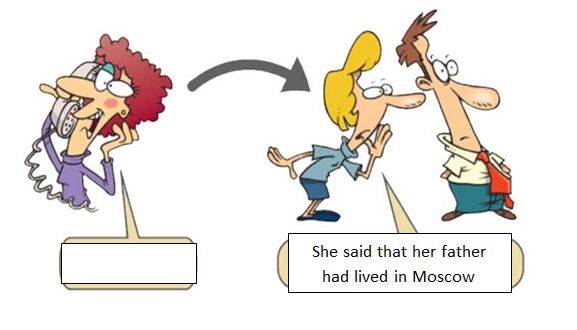Тестовые задания по английскому языку для 7 класса по теме: «Косвенная речь в английском языке»
Правильный вариант ответа отмечен знаком +
1. Как в английском языке называется речь какого-нибудь человека, которая передается буквально слово в слово?
- reported speech
+ direct speech
- indirect speech
-unreported speech
2. В косвенной речи «я» меняется на:
+ третье лицо
- второе лицо
- множественное число
- не меняется
3. Какой союз добавляется перед сказуемым при переводе прямой речи в косвенную?
- this
- those
+ that
- these
4. На какое слово меняется слово «this» при переводе прямой речи в косвенную?
- these
+ that
- those
- не меняется
5. В каком варианте не допущена ошибка?
- Jerry asked to me if I could swim.
- Jerry asked to me can I swim.
- Jerry asked me could I swim.
+ Jerry asked me if I could swim.
6. «George told …». В каком варианте указано правильное продолжение данного предложения?
- to me he is a singer.
+ me he was a singer.
- to me he was a singer.
- me he is a singer.
7. В каком варианте представлен правильный перевод предложения «She said: “I’m hungry”» в косвенную речь?
+ She said that she was hungry.
- She said that she is hungry.
- She said I was hungry.
- She said I am hungry.
8. В каком ряду указан модальный глагол, который при переходе в косвенную речь может меняться в прошлое время?
- need
- ought
+ can
- must
9. В каком варианте представлена правильная схема предложения с косвенной речью?
- Вводное слово – слова автора – косвенная речь.
+ Слова автора – вводное слово – косвенная речь.
- Слова автора – косвенная речь – вводное слово.
- Вводное слово – косвенная речь – слова автора.
тест 10. Если в прямой речи главное предложение – в Past Simple, придаточное – в Present Perfect, то в косвенной речи придаточное предложение будет в:
- Past Perfect Continuous
- Past Simple
+ Past Perfect
- Present Perfect
11. «The man told …». В каком варианте указано правильное продолжение данного предложения?
- to me not to sing too loud.
- me to not sing too loud.
- to me not to singing too loud.
+ me not to sing too loud.
12. В каком варианте представлен правильный перевод предложения «Alina said: “I am reading now”» в косвенную речь?
- Alina said that she was reading now.
+ Alina said that she was reading then.
- Alina said that she is reading then.
- Alina said that she is reading now.
13. В каком ряду указан модальный глагол, который при переходе в косвенную речь может меняться в прошлое время?
+ have to
- should
- will
- ought
14. В каком варианте не допущена ошибка?
- My friend asked to me if I had a book about animals.
+ My friend asked me if I had a book about animals.
- My friend asked me had I a book about animals.
- My friend asked me I had a book about animals.
15. Если в прямой речи главное предложение – в Present Simple, придаточное – в Past Simple, то в косвенной речи придаточное предложение будет в:
- Past Simple
- Past Perfect Continuous
+ Past Perfect
- Present Simple
16. «The teacher … us where we had been an hour ago». Какое слово здесь пропущено?
- told
- said to
+ asked
- asked to
17. В каком варианте представлен правильный перевод предложения «Robert: “My mother is cooking.”» в косвенную речь?
+ Robert said that his mother was cooking.
- Robert said that his mother is cooking.
- Robert asked that his mother was cooking.
- Robert says that his mother was cooking.
18. «Jim asked …». В каком варианте указано правильное продолжение данного предложения?
- me where his parents were yesterday.
+ me where his parents were the day before.
- to me where his parents were the day before.
- me where were his parents the day before.
19. Посмотрите на рисунок и скажите, какое предложение пропущено?

+ She said she liked tomatoes.
- She said she likes tomatoes.
- She said she like tomatoes.
- She said she had liked tomatoes.
тест-20. На какое слово меняется слово «tomorrow» при переводе прямой речи в косвенную?
+ the next day
- the last day
- that day
- не меняется
21. «Lisa said …». В каком варианте указано правильное продолжение данного предложения?
- that she was going to London following week.
+ that she was going to London the following week.
- that she was going to London the next week.
- that she was going to London next week.
22. В каком варианте представлен правильный перевод предложения «My sister asked me: “Clean your room.”» в косвенную речь?
+ My sister asked me to clean my room.
- My sister asked me to clean your room.
- My sister asked me that clean your room.
- My sister asked me that I clean my room.
23. Ann: «I spent my summer holidays in the village». Переведите данное предложение в косвенное:
- Ann said that she spent her summer holidays in the village.
+ Ann said that she had spent her summer holidays in the village.
- Ann said that she had spent my summer holidays in the village.
- Ann said that she had spent my summer holidays in the village.
24. В каком варианте представлен правильный перевод предложения «Masha said: “I forgot my keys at home.”» в косвенную речь?
- Masha said that she forgot my keys at home.
- Masha said that she had forgotten my keys at home.
+ Masha said that she had forgotten her keys at home.
- Masha said that she forgets her keys at home.
25. Посмотрите на рисунок и скажите, какое предложение пропущено?

+ My father lived in Moscow.
- My father live in Moscow.
- My father lives in Moscow.
- My father have lived in Moscow.
26. В каком варианте не допущена ошибка?
- Bill said that he had been at the meeting the last day.
- Bill said that he had been at the meeting the next day.
- Bill said that he had been at the meeting yesterday.
+ Bill said that he had been at the meeting the day before.
27. В каком варианте представлен правильный перевод предложения «Nick said: “I can speak French very well.”» в косвенную речь?
- Nick said that he an speak French very well.
+ Nick said that he could speak French very well.
- Nick said that he could to speak French very well.
- Nick said that I could speak French very well.
28. На какое слово меняется слово «yesterday» при переводе прямой речи в косвенную?
- the last day
+ the day before
- the next day
- не меняется
29. Какой модальный глагол при переходе в косвенную речь может меняться в “had”?
- should
- ought
+ must
- may
тест_30. В каком варианте представлен правильный перевод предложения «The teacher ordered: “Don’t run in the corridor.”» в косвенную речь?
- The teacher ordered don’t run in the corridor.
- The teacher ordered to not run in the corridor.
- The teacher ordered to run not in the corridor.
+ The teacher ordered not to run in the corridor.
Авторские права принадлежат редактору Черных Анастасии Кирилловне
